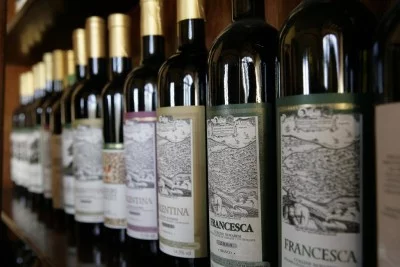About Winery and Wines
The history of Roccolo Mezzomerico goes back in time several centuries. lt seems that here in defense of Mezzomerico village existed until '600 a mediaeval fortress. The only remaining find is a small bridge under which passed the old road that connected the Ticino river with Ghemme, where it was cultivated since Roman time Nebbiolo, prince of the vines. The Roccolo is a building risen on the ruins of the ancient fortress: surrounded by a tall hedge of hornbeam over the centuries has been used for hunting birds with nets and is now used to dry the grapes to produce sweet wines. At the foundation of the Cantina Sociale di Oleggio in 1891 (the oldest social wine producer in ltaly), the grapes of Roccolo represented a symbol of this area particularly vacated to great wines. One of the founders of Cantina Sociale di Oleggio was the great-grandfather of the present owner of the estate Pietro Gelmini who 15 years ago has made a lifestyle choice to return with his wife Margherita and the daughters Valentina and Francesca to his family country.
The Roccolo Mezzomerico with completely renovated plants grows its own grapes on 8 hectares set in a wonderful setting on the top of a hill 300 meters above sea level: 5 hectares of Nebbiolo, 1 hectare of Bonarda Novarese (Uva Rara) and Vespolina, 2 hectares of Erbaluce and Chardonnay. The Roccolo follows an integrated procedure for the cultivation of the vineyards in respect of the environment: it does not use herbicides and an agronomist expert, with continuous monitoring of meteorological and agronomic situation, identifies the needed and more effective actions. Every plant in the vineyard produces only few bunches that contain so higher concentrations of sugars, polyphenols, protein, glycerin and flavorings. Before the harvest the imperfect grapes are removed; in harvest only the best grapes are allocated for the production of DOC wines. These choices enabled to obtain since in the early years of production significant awards for the quality of the wines offered.
